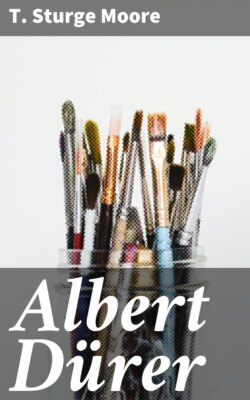Читать книгу Albert Dürer - T. Sturge Moore - Страница 21
На сайте Литреса книга снята с продажи.
VII
ОглавлениеTable of Contents
It remains now to see in what degree these ideas were felt or made themselves felt through the Romanism and Lutheranism of the Renascence period. Perhaps we English shall best recognise the presence of these ideas, the working of this leaven--this docility, the necessary midwife of 'genius, who transforms the difficult tasks which the human reason sets herself into labours of love--in an Englishman; so my first example shall be taken from Erasmus' portrait of Dean Colet.
It was then that my acquaintance with him began, he being then thirty, I two or three months his junior. He had no theological degree, but the whole University, doctors and all, went to hear him. Henry VII took note of him, and made him Dean of St. Paul's. His first step was to restore discipline in the Chapter, which had all gone to wreck. He preached every saint's day to great crowds. He cut down household expenses, and abolished suppers and evening parties. At dinner a boy reads a chapter from Scripture; Colet takes a passage from it and discourses to the universal delight. Conversation is his chief pleasure, and he will keep it up till midnight if he finds a companion. Me he has often taken with him on his walks, and talks all the time of Christ. He hates coarse language, furniture, dress, food, books, all clean and tidy, but scrupulously plain; and he wears grey woollen when priests generally go in purple. With the large fortune which he inherited from his father, he founded and endowed a school at St. Paul's entirely at his own cost-- masters, houses, salaries, everything.
He is a man of genuine piety. He was not born with it. He was naturally hot, impetuous and resentful--indolent, fond of pleasure and of women's society--disposed to make a joke of everything. He told me that he had fought against his faults with study, fasting and prayer, and thus his whole life was in fact unpolluted with the world's defilements. His money he gave all to pious uses, worked incessantly, talked always on serious subjects, to conquer his disposition to levity; not but what you could see traces of the old Adam when wit was flying at feast or festival. He avoided large parties for this reason. He dined on a single dish, with a draught or two of light ale. He liked good wine, but abstained on principle. I never knew a man of sunnier nature. No one ever more enjoyed cultivated society; but here, too, he denied himself, and was always thinking of the life to come.
His opinions were peculiar, and he was reserved in expressing them for fear of exciting suspicion. He knew how unfairly men judge each other, how credulous they are of evil, how much easier it is for a lying tongue to stain a reputation than for a friend to clear it. But among his friends he spoke his mind freely.
He admitted privately that many things were generally taught which he did not believe, but he would not create a scandal by blurting out his objections. No book could be so heretical but he would read it, and read it carefully. He learnt more from such books than he learnt from dogmatism and interested orthodoxy.[12]
Some may wonder what Colet could have found to say about Christ which could not only interest but delight the young and witty Erasmus; and may judge that at any rate to-day such a subject is sufficiently fly-blown. The proper reflection to make is, "A rose by any other name would smell as sweet."
Whether we say Christ or Perfection does not matter, it is what we mean which is either enthralling or dull, fresh or fusty; "there's nothing in a name."
"When Colet speaks I might be listening to Plato," says Erasmus in another place, at a time when he was still younger and had just come from what had been a gay and perhaps in some measure a dissolute life in Paris: not that it is possible to imagine Erasmus as at any time committing great excesses, or deeply sinning against the sense of proportion and measure.
Success is the only criterion, as in art, so in religion: the man that plucks out his eye and casts it from him, and remains the dull, greedy, distressful soul he was before, is a damned fool; but the man who does the same and becomes such that his younger friends report of him, "I never knew a sunnier nature," is an artist in life, a great artist in the sense that Christ is supposed to have been a great master; one who draws men to him, as bees are drawn to flowers. Colet drew the young Henry the Eighth as well as Erasmus. "The King said: 'Let every man choose his own doctor. Dean Colet shall be mine!'" Though no doubt charlatans have often fascinated young scholars and monarchs, yet it is peculiarly impossible to think of Colet as a charlatan.
